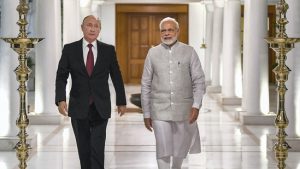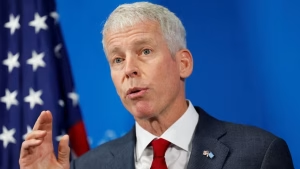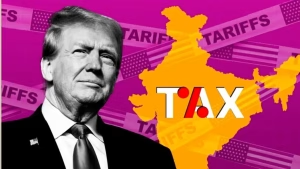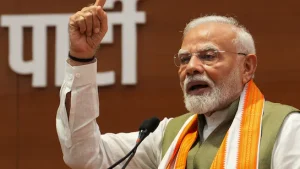Washington D.C. – US Energy Secretary Chris Wright has expressed mixed sentiments regarding America’s relationship with India, particularly concerning India Russian oil purchases. While describing India as an “awesome ally” and declaring himself a “huge fan of India,” Wright simultaneously raised concerns about New Delhi’s continued energy trade with Moscow amid ongoing sanctions.
The Energy Secretary’s comments highlight the complex dynamics surrounding India Russian oil transactions and their impact on US-India relations. Wright emphasized that America wants to expand energy cooperation with India while addressing the friction caused by Russian oil imports that potentially fund the Ukraine war.
Strategic Partnership Despite Energy Disagreements

Wright’s statements reflect the nuanced approach the Trump administration is taking toward India Russian oil purchases. During a press briefing, he acknowledged India as “the world’s largest democracy, a fast-growing economy and a truly dynamic society,” while noting that much of his early tenure has involved dealing with India-related energy matters.
The Energy Secretary praised India’s growing energy demands as people “are increasing their prosperity and their opportunities,” demonstrating understanding of India’s developmental needs. However, he maintained that India Russian oil purchases create complications in the broader geopolitical context, particularly regarding the Ukraine conflict.
Ukraine War Funding Concerns
Wright directly addressed how India Russian oil purchases allegedly contribute to funding the Ukraine war. He explained that sanctioned Russian oil primarily flows to “China, India, and Turkey,” with these purchases helping Russia finance its military operations in Ukraine.

The Energy Secretary emphasized President Trump’s commitment to global peace, stating that “President Trump’s greatest passion is peace in the world” and that peace discussions arise regardless of the topic being discussed. This context frames the administration’s view that India Russian oil transactions indirectly support conflict continuation.
Wright expressed his belief that both the United States and India share the common goal of ending the Ukraine war, suggesting that addressing India Russian oil purchases could contribute to this objective. The administration views these energy transactions as creating unnecessary “friction” in otherwise strong bilateral relations.
Tariff Implications and Economic Pressures

The discussion of India Russian oil purchases comes amid President Trump’s implementation of a 25 percent penalty tariff on India. This economic measure directly targets India’s energy relationship with Russia, representing a significant shift in trade policy toward a key strategic partner.
Trump recently accused China and India of being “primary funders” of the Ukraine war through their continued Russia Russian oil purchases. This accusation was made during his address to the United Nations General Assembly, where he also criticized NATO allies for maintaining their own Russian energy relationships.
The tariff represents more than just economic policy; it signals the administration’s determination to pressure allies regarding India Russian oil transactions. US officials have indicated that reaching a compromise on Russian energy purchases is necessary before the penalty tariff can be removed.
Future Energy Cooperation Prospects
Despite current tensions over India Russian oil purchases, Wright emphasized America’s desire to expand energy trade with India across multiple sectors. He specifically mentioned opportunities in “natural gas, coal, nuclear, and clean cooking fuels, liquid petroleum gas,” noting India’s success in these areas.
Also Read: Marco Rubio On US India Ties: Critical Push to Resolve Tariffs and Boost Relations
The Energy Secretary’s vision for enhanced cooperation suggests that resolving the India Russian oil dispute could unlock significant bilateral energy potential. He stated that America “wants nothing more than trade, energy cooperation with India,” indicating the administration’s long-term strategic interests.
State Secretary Marco Rubio has also weighed in on the India Russian oil controversy, suggesting that the tariff situation is “something we hope we can fix.” This statement implies ongoing diplomatic efforts to find mutually acceptable solutions to the energy dispute.
India’s Defensive Position


India has consistently defended its India Russian oil purchases as market-driven decisions essential for maintaining energy security. New Delhi argues that these transactions are based on practical considerations rather than political alignments, emphasizing the importance of diversified energy sources for economic development.
The Indian government maintains that India Russian oil purchases represent legitimate business relationships that predate current geopolitical tensions. This position reflects India’s broader foreign policy approach of strategic autonomy in international relations.
Path Forward for US-India Relations
The ongoing debate over India Russian oil purchases represents a critical test for US-India strategic partnership. Wright’s balanced approach—combining appreciation for India’s democratic values and economic growth with concerns about energy choices—suggests potential diplomatic solutions.
Recent developments indicate that trade talks between the two countries are back on track despite the energy dispute. This progress suggests that both sides recognize the importance of maintaining broader strategic cooperation while addressing specific disagreements over India Russian oil transactions.
The resolution of this dispute will likely require creative diplomatic solutions that acknowledge India’s energy security needs while addressing American concerns about indirectly funding the Ukraine conflict through Russian oil purchases.

